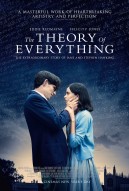 Since it’s release stateside I’ve been hearing good and bad about The Theory of Everything, the biopic about cosmologist Stephen Hawking. The conversations about the film increased when the Academy Award nominations were announced and the film took several spots, including a nod for Best Picture, Best Adapted Screenplay, Best Music and two for the lead actors, Felicity Jones for portraying Hawking’s put upon wife, Jane, and Eddie Redmayne for playing Hawking himself.
Since it’s release stateside I’ve been hearing good and bad about The Theory of Everything, the biopic about cosmologist Stephen Hawking. The conversations about the film increased when the Academy Award nominations were announced and the film took several spots, including a nod for Best Picture, Best Adapted Screenplay, Best Music and two for the lead actors, Felicity Jones for portraying Hawking’s put upon wife, Jane, and Eddie Redmayne for playing Hawking himself.
A handsome British heartthrob playing a tousle-haired, permanently smiling physicist with crooked glasses and a degenerative disease isn’t a performance that should be nominated for an Oscar, it’s a performance that should be nominated at a parody of the Oscars. And that’s fair. The Oscars certainly favor actors playing people with disabilities. However, I think the bigger problem here is that Redmayne actually does deliver a decent performance but the film itself relies entirely on the fact that it’s Oscar bait to carry it through.
To begin with, the screen writer, Anthony McCarten, has no clue what story he’s telling. This may be because he’s playing to two masters. The film is based on the book Traveling to Infinity by Hawking’s ex, Jane and so is focused on her story being with him. But no one really gives a rat’s ass about a professor of Spanish poetry so the film had to focus on Dr. Hawking. Problem with that, no matter how good a performance Redmayne gives, he’s playing a disease, not a real character. In fact, this is the problem with the whole film: There are no real characters. While I’d love to blame this on the script (there’s an old quote I’ve heard attributed to Roger Ebert that says if “the film is good, the director gets the credit, but if it’s bad, the writer gets the blame.”), and lord knows I don’t think the script is anything worth holding up as an example, the blame here really belongs with director James Marsh.
Marsh, whose background is in documentary, might have done better if he had treated this film as if it were a documentary instead of a fictional story. He skims the surface of 60 years of the Hawkings’ life without ever getting his hair wet. There is no consistency in the visual grammar, there is no sense of space and ironically, considering the subject, there’s no sense of time. The characters never age, only change hairstyles. We’re given a date at the start of the film (1963) and everything else happens whenever it happens. We’re told Hawking has two years to live but then there are babies and computers and electric wheelchairs. We never see the characters reacting to the world around them. In fact, the only glimpse we get at character is Jones’ performance. There are moments when she’ll let something slip, an eyebrow or hint of a frown where we think there might be an inner life to her version of Jane.
Redmayne gives us a little bit of that but by halfway through the film, he’s lost to his quirks. The way the film is shot, there’s almost no actual interaction between the characters, leaving Redmayne’s performance in the same vein as Dustin Hoffman‘s in Rain Man – acting in a vacuum, not having to worry about what their scene partner was doing.
Interestingly, Hawking himself comes off a bit like a dick. He’s funny, sure, we get that at the end, but he’s also so closed off from us we’re never allowed to see his inner struggles. We just get the highlights of his life. That said, for me, the most telling thing was that in all of this, the one thing he never does, is tell Jane he loves her. And that is the theory of everything. If he doesn’t or can’t, we need to know why she stayed with him (and the shorthand of religion is a cheap explanation) and if he did, why don’t we see it? The only time he ever gets emotional is when he’s leaving her and then, you get the feeling it’s more him he’s crying for than her.


I think Jones’ performance was remarkable. I think she carried more of this film than you give her credit for. The best choice Marsh made in the editing room was to focus on her performance in the croquet sequence. I think Redmayne gets credit for our empathy with her performance. She sells his progression. But it’s never the straight man who gets the credit.
That’s fair. I just didn’t like the direction in general. Of the two leads, yes, I’d say Jones was better – in fact, and I guess I never stated it outright, this was the point of my Rain Man comparison. Cruise was by far the better performance in that film the same way Jones was here. She was carrying the film for both of them.
And I agree with you that the “pen” sequence was shameless and manipulative and, in my mind, rude.